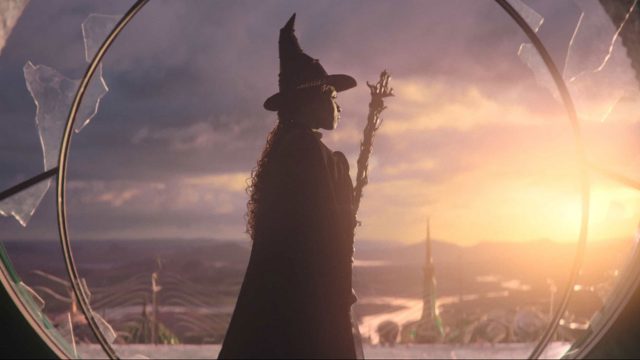Flying in this Week With:
- A defiance of gravity
- Manly, manly men
- Defiant authors
- Long walks
- The cool crime of stealing!
If you want to be pop-u-oo-lar like scb0212, send articles throughout the next week to ploughmanplods [at] gmail, post articles from the past week below for discussion, and Have a Happy Friday!
The Verge‘s Charles Pulliam-Moore opines that the new Wicked adaptation shows why audiences love musicals – even if nobody thinks they do:
It’s become strangely common for studios to downplay the fact that their musicals are movies filled with people singing and dancing. But there was really no way for Universal to hide how much of a theater geek’s fever dream its long-gestating Wicked adaptation was going to be. Like the show and the novel it is based on, the Jon M. Chu-directed feature remixes details from The Wizard of Oz into a surprisingly poignant tale about Oz’s most infamous witch. The film is as gorgeous as its musical numbers are tremendous, and there’s a depth to its story that makes a case for it being split into two parts. But the way Wicked unabashedly plays up the original’s fanciful sense of humor and uses its songs to do all the heavy narrative lifting is what’s going to remind audiences why they love this genre.
Meanwhile, Vulture‘s Alison Willmore pits Gladiator II versus the era of the original and says something has gone amiss:
I can’t say that the trouble all started when Hollywood ceded romanticized historical masculinity to RETVRN accounts that insist that brutalist architecture is bad and eating enormous amounts of raw liver is good. But I wouldn’t say that’s entirely inaccurate, either? The trick of movies like Gladiator and Master and Commander, which came out within ten years of each other during what now feels like the last stretch in which these sort of throwback epics consistently got traction with large audiences, is that their bloodshed and grand speeches provided shelter for a lot of sentimentality — about honor and dying for what you believe in, sure, but also about men unabashedly relishing the camaraderie of other men. […] I didn’t adore Gladiator, but I appreciated the melodramatic conviction at its core, the way it was unabashedly emotional about grief and justice and restoring order to the world. Gladiator II echoes elements from the first film, including talk of the “dream of Rome” as a more egalitarian place, but while that idea is more central to the plot in the sequel, it feels even more abstract. Rome in this film isn’t solid enough to require saving or destruction — it’s a series of historical interiors the characters pass through.
In Galerie, Katya Apekina talks about the long city walk in Cléo from 5 to 7:
This movie captures like nothing else I’ve seen the transcendence of going on city walks. I too am often finding myself in a vortex of my own fears. Sitting feels impossible and walking is the only cure. At times in my life when grief gave me tunnel vision, moving among strangers, overhearing snippets from their conversation, noticing a bird or a cloud or somebody’s crumpled up biology notes or a spray-painted penis or a halo around the moon—this is the detritus that brought me back to myself. It’s through walking around Paris that life seeps in for Cléo: chance encounters, street performers, possibly even love—all set against the excitement, oddness and largeness of the city.
At The Mary Sue, Rachel Ulatowski relates a tale of James Patterson’s response to a studio that wanted to whitewash his most famous character:
During an interview with The Hollywood Reporter, Patterson revealed that he received very early movie deals after the release of Along Came a Spider. At the time, he was a budding author and didn’t have much money. He recounted, “When I wrote the first Alex Cross book, I didn’t have a lot of money and Hollywood came calling — knock, knock, knock, knock, knock. They offered seven figures, and I did not have a lot of money.” However, there was one condition to the alluring seven-figure movie deal. Patterson stated, “They said, ‘We just want one change; we want Alex to be a white guy.’” In response, Patterson said, “F**k you.”
A year earlier, in the summer of 2022, when Brand answered the doorbell he found a large box and nobody in sight. Inside was one of the most important relics in the Catholic faith, one that allegedly contained the blood of Christ. It had been stolen the previous July from the Holy Trinity Abbey in Normandy, and soon after he’d received an email from a woman who’d seen him on Dutch television. The thief, she said, thought he was stealing gold—and now he was stuck with an unsellable religious relic. The source said it was being stored at the house of a relative who was superstitious and wanted the piece gone. Brand didn’t know if the caller was joking or not, but he agreed that the treasure could be left at his doorstep. With the blood in his possession, Brand, who’s Catholic, crossed himself and called the police. As it happened, both the French and Dutch police were on vacation—it would take another few weeks for the relic to return home to France. In the meantime, it sat on his counter. After years on the trail of art thieves, 54-year-old Brand views his compensation as getting to enjoy a little time with the stolen treasure. “I worship them for a night,” he says. “The pleasure is in having a Van Gogh on my couch.”

